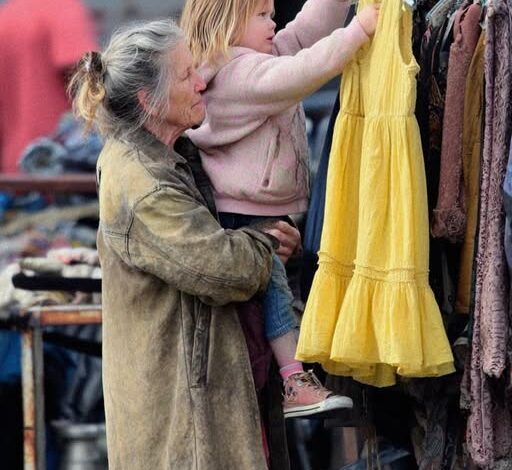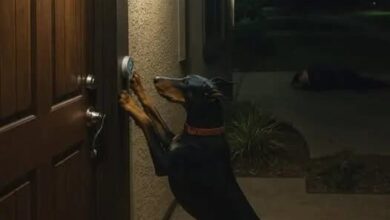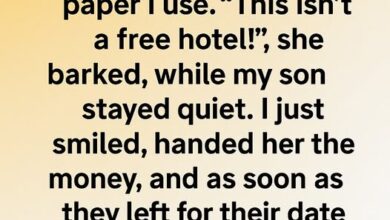
I Bought a Dress for a Girl I Met at a Flea Market, The Next Day There Was a Knock at My Door and I Froze
Some days life feels like an endless loop of chores—unpaid bills stacked on the counter, dripping faucets, and leftover dinners no one wants. But every now and then, there are moments so small, so unexpected, that they shift something inside you.
That moment for me began with a yellow dress.
I’m Rachel, a single mother to an eleven-year-old daughter named Lily. My husband passed away when Lily was only two, and since then, I’ve been the one holding everything together. I work at a little home goods store sandwiched between a bakery and a nail salon. It’s not glamorous work, but it pays the bills and keeps food on the table.
Most days, I tell myself that’s enough.
Lily is smart, independent, and far wiser than most kids her age. Losing her father so young gave her that old-soul way of looking at the world. She’s my reason for getting up every morning. We don’t have much, but we have each other, and most of the time, that’s more than enough.
One chilly afternoon after work, I stopped at the flea market. It was my guilty pleasure—wandering through stalls filled with chipped mugs, old books, and secondhand treasures. The air smelled of roasted nuts, cinnamon, and damp autumn leaves. It always felt like a pause button in the middle of my messy life.
That’s when I saw them.
A little girl, no older than five, holding tightly to her grandmother’s hand. Her coat was too thin for the crisp air, and her sneakers were worn at the toes. She stopped suddenly at a rack of children’s clothes, her eyes wide with wonder.
“Grandma, look!” she exclaimed, pointing at a pale yellow dress trimmed with lace. “If I wear this, I’ll be a princess at the kindergarten fall festival!”
The grandmother leaned closer, squinting at the price tag. Her expression fell. She crouched down, brushing a strand of gray hair from her forehead.
“Honey,” she said gently, “this is our grocery money for the week. Not this time.”
The little girl tried to smile bravely, but her voice cracked. “It’s okay, Grandma.”
It wasn’t okay. I could see it in her eyes.
And just like that, I was back in time—Lily at that same age, spinning in the one festival dress I’d barely managed to afford. I remembered the relief of seeing her smile and the tears I cried later, hidden in the bathroom, because I couldn’t give her more.
Before I could second-guess myself, I grabbed the yellow dress, handed a ten-dollar bill to the vendor, and hurried after them.
“Excuse me!” I called, jogging past a kettle corn stall. “Ma’am, wait!”
The grandmother turned, startled. I held out the bag.
“This is for her,” I said softly. “Please, take it.”
Her eyes welled with tears. “I… I don’t know what to say. I’m raising her alone. Things have been so tight. You don’t know what this means.”
“I do,” I said. “I’ve been where you are. Please, let her have it.”
The girl’s face lit up as she clutched the bag. “Grandma! It’s the dress! The one I wanted!” She squealed and hugged it to her chest.
I watched them walk away, the lace peeking from the bag, and felt something shift inside me—a small repair in a place I hadn’t realized was still cracked.
The next morning, I was packing Lily’s lunch when a firm knock rattled the front door. We weren’t expecting anyone. I opened it to find the grandmother and the little girl standing on my porch.
The grandmother wore a pressed coat, her hair neatly pinned back. The child—her name, I’d soon learn, was Ava—wore the yellow dress, a ribbon in her hair, her cheeks rosy from the cold. She held a gold gift bag in her small hands.
“Good morning,” the grandmother said. “I hope we’re not intruding. I’m Margaret, and this is Ava. We wanted to find you, to thank you properly.”
Ava thrust the bag toward me. “We made you something!”
Inside was a handmade bracelet—mismatched beads strung together in autumn shades of gold, red, and orange. My throat tightened.
Just then, Lily wandered in, still searching for her missing sock. She froze at the sight of Ava and smiled. “That’s the princess dress Mom told me about!”
Ava twirled proudly, her skirt flaring out. Margaret’s eyes softened as she looked at me.
“You gave her more than a dress,” she said. “You gave her joy. You reminded me the world can still be kind.”
From that day on, Margaret and Ava became part of our lives. They invited us to Ava’s school festival, where she performed in her yellow dress, glowing with confidence. Margaret started visiting often, always with food—stews that tasted like home, soft rolls, and apple dumplings wrapped in paper-thin dough.
Lily quickly grew attached, calling Margaret “Grandma” without hesitation. Ava, too, found comfort in us, curling beside me during movie nights or asking me to braid her hair.
We weren’t trying to replace anyone. We were simply filling in each other’s quiet spaces.
One evening, as Margaret stirred mashed potatoes at my stove, Lily sighed dramatically. “There’s a boy in my class named Mason. He smells like pinecones and lemon gum.”
Margaret didn’t miss a beat. She swatted Lily with a dish towel. “You’re twelve. No boys until you’re eighteen. Maybe twenty.”
Ava giggled from the table. “What if she likes two boys?”
“Then she better learn to make dumplings. Only food can fix that kind of crisis,” Margaret declared.
The kitchen erupted in laughter, warm and unguarded, the kind that settles deep into the walls.
And just like that, we became something new. Not quite strangers, not exactly family—but absolutely home.
Sometimes the life you build isn’t the one you planned. Sometimes it arrives as a knock at the door, wrapped in lace and laughter, and reminds you that love often sneaks in sideways, then makes itself at home.




